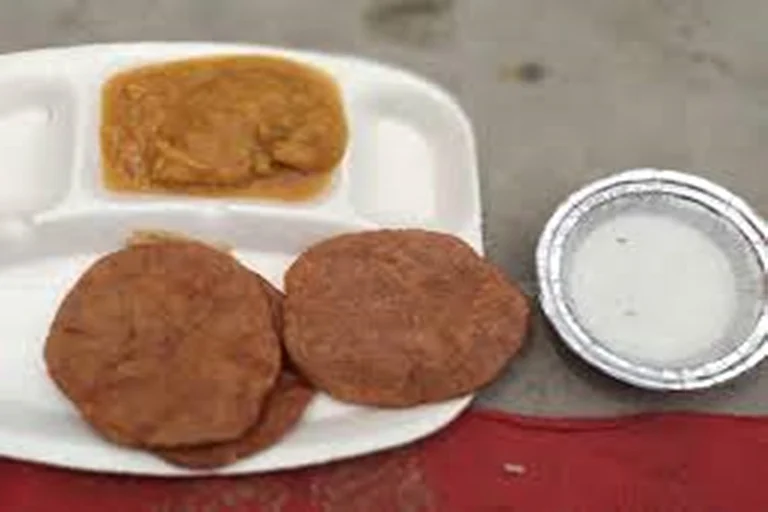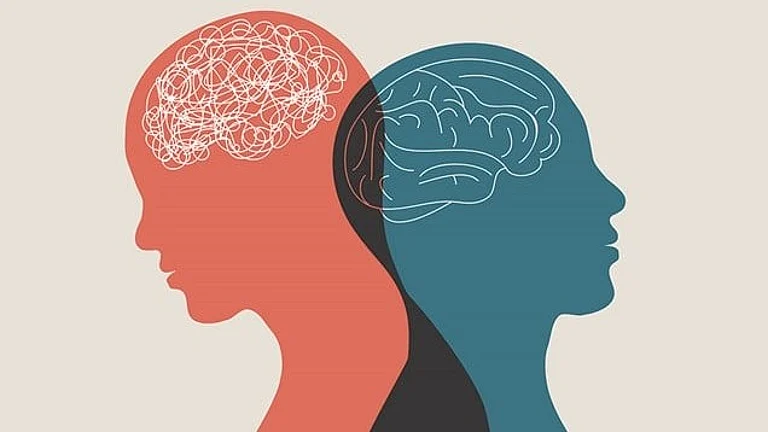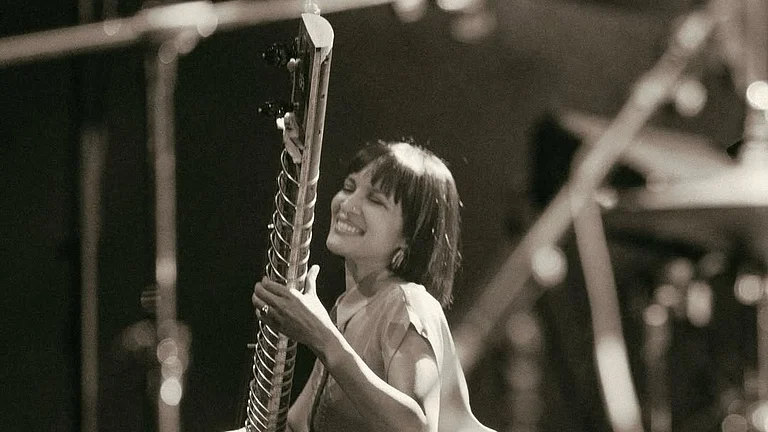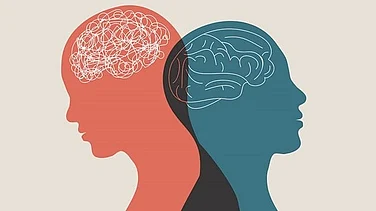My mother was already schizophrenic when I was born. I think I was ten months old and we were in Rourkela when on a chilly winter night, I was stark naked, and my mother was trying to make me pee outside our home in the garden. My father came back from a late shift at work and he was at the gate. Seeing my mother walking around in the garden, following me, he said, “My God, what is this!”
That’s when he realised that there was something really off with her, but my mother’s illness goes back to much earlier in her life because both my Mama and Maasi have told me things about her. He too had been hearing from his friends’ wives about his wife’s “odd behaviour”, although like in a typical arranged marriage, they didn’t really communicate with each other.
I was five or six when I used to take my mother for injections to the doctor on Thursday mornings whenever my father had a late shift at work and was too tired in the mornings. It came to me very naturally. I wrote about all this in my book Sepia Leaves from a child’s point of view. It’s not about me trying to say that I knew most of it, because I still don’t.
I think when it happens that early in life, or when it is a thing that you’ve just grown up with, it shapes everything about you. It shaped everything about me—my response to the world, my attitude towards wanting to stay grounded in, rather than fly with. I think my whole way of living is determined by my mother’s illness and my father’s inability to shield me, the family, or us, from what was going on. Despite his best efforts, he could not shield us. He could not really take care of my mother elsewhere, so he tried very hard, poor thing. So everything about me is shaped by this sense of what is normal and what is abnormal. Because abnormal was the normal for me. I figured this is how things are, unless I saw some other family which worked more coherently with each other.
For me, it was like, this is everything, and even now, my responses have much to do with it. I grew up for a long time thinking that I will become schizophrenic. I’ve been through depression twice. I wish I would be free from all of this, but not in this life. It has just become these two big bug bears I’m dealing with. It really shifted something in me, and I became grounded—all my posts, my writings, everything is basically a way of making meaning.
I got a lot of courage from my mother. She was a very brave woman. I don’t know whether I’m courageous or not, but at least I I feel that if her genes are in me, then they must show up somewhere.
Another big way that it influenced me was the decision to remain child-free. Because I was managing my mother and I’m basically a parentified child; these are children on whom the responsibility of managing their parents falls too early.
I was 35 when my mother died. All those years, whether in person or remotely, I was taking care of her, right? So, the joy of taking care of somebody—that didn’t exist for me. I just wanted my childhood back.
I didn’t have anybody to talk to at that point. And that’s why, in the book itself, you’ll see Appu the character creates another character in his head (Bopu) before he talks, because there was nobody to speak to, nobody who could understand. My father was very generous though. We had this little ritual between us. He told me that whenever he’s home, at least two of three weeks, every evening, at eight, we’ll both go to the veranda, sit here, and I could ask him any question and he’d try to answer them. Sometimes, if he didn’t have the answers, he would tell me that I’ll find out and tell you; sometimes, he would get back to me months later, saying, you asked me this. This is the answer to it.
“I was five or six when I used to take my mother for injections to the doctor on Thursday mornings since my father had a late shift at work and was too tired in the mornings.”
Once I got to Bangalore, I shifted from journalism to technical writing, because the IT sector was booming. I brought my parents over to Bangalore, took care of them for seven years. You know, intense caregiving...I felt that willy-nilly, their dignity has been compromised a lot in life, with each other, as well as with the world, in the way it has looked at us. So at least they needed dignity to live with. Basically, I didn’t know they were so far gone at the point at which they came to live with me. And they were very young. Each of them passed away at the age of 65, father died in 2003 and mother in 2007.
At that point in India’s IT industry, there were a lot of opportunities to go abroad; you could even migrate. In fact, a few years before that, I had got an offer to go abroad and study, but I didn’t take that, because I knew I had to take care of my mother. Who would take care of her otherwise? Every quarter, my manager would call me and say, “We need to send you to the US for two, three months.” I would say, “Sorry, I can’t go”. And then I started feeling that I will resent not going, not travelling the world, and I will foist that resentment on my mother, who is not asking me to stay back. She wasn’t saying you stay here and take care of me. But I would feel that I made the sacrifice for her. So then I started making some arrangements, leaving her with her brother, sister, travelling abroad, coming back and picking her up and stuff like that. But yes, I did feel tied down. I mean, your growth is very determined by these constraints around you.
One of the reasons to write Sepia Leaves (a memoir from a child’s POV), which was published in 2008, was that the world had rejected us, you know? Whether it was within the family or it was neighbours. And the thing I hated the most was the pity people would give me.
The other thing I hated was people calling me “paagal ka bachcha”. So I wrote this book. I thought, okay, here, I’m stripping down, lying down naked on the road. Crush me, you know, just be done with me, and I will handle it myself.
I think there is an imbalance in the approach to mental illness. It is essentially a triad: there is a sufferer who is suffering internally as well. They are suffering, there’s no doubt, and they’re making their environment suffer too because they’re not falling in line with whatever you want them to do. And then there’s a doctor who has the power to diagnose, to label, to prescribe, and then the doctor is out of the scene until the next visit, when he/she gives you 15 minutes to talk, sometimes even lesser. And the whole burden of that falls on the care team. I’m certainly on the side of the caregiver.
I know so many people who have restricted their lives because they have a brother, a sister, or a parent with a mental illness. In the kind of public sector unit I grew up in, a town with a steel factory (these were the first experiments in nuclear families in India), your neighbour could be a Tamilian, another could be a Muslim from Bengal, someone else could be from Kashmir. People from all over would be around you. So, you are displaced from the regular joint family systems in your villages or small towns. In the kind of milieu where my mother’s illness flares up, everybody around can see. People three sectors away know that ‘a mad woman’ lives in that house. I compare it to what would happen in joint families.
In joint families also they were some ‘sidras’, as we say in Punjabi, you know, slightly not-so grounded persons, but they had children and all that, and they would grow up with other children in the family. Sure, there are many problems with that kind of upbringing, but all our parents grew up in such situations.
Our generation was the one to go the nuclear unit way, and the next one is going to be alienated even further. A nuclear family lacks all the mechanisms to handle such a thing in their midst, and that is why their lives get restricted as well.
I know of people who can’t date, who can’t have permanent alliances, like my own cousin, who, by the time she was in her early 30’s, returned to India from her job abroad to look after her parents—one had Parkinson’s, the other, Alzheimer’s. She took care of them for eight years, and in the meantime, she did not get married, because who would marry a woman who has two ageing, broken parents? Nobody wants that package, right? It’s not as if she can leave them in the village and say you handle yourselves, I’ll send money. I know of many such people through my work as a mental health listener. I see many people compromise their lives because of this. The mental health issues in our society are growing exponentially. The new generation has anxiety and stress-related problems, but the incidence of even more dramatic illnesses is increasing right now.
As for institutional support, if you are visually challenged, or you don’t have a leg or an arm, you can petition the government. You can go to the Gandhi statue in your city and stage a protest. But when you are mentally ill, you hide in a dark room. The first symptom of mental illness is that you don’t go out and you can’t tell anybody that you’re not well. As a result, not enough attention is paid to them. This is a huge issue here, and then the way patriarchy works, the way feudalism works, the way our society is so bloody obnoxious about diversity, of people just being different...
(As told to Lalita Iyer)
MORE FROM THIS ISSUE
Share Your Stories Of Caregiving For Someone With Mental Illness: freedomfromstigma@outlookindia.com



























